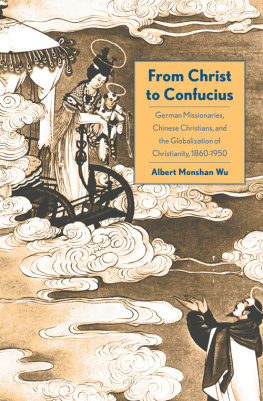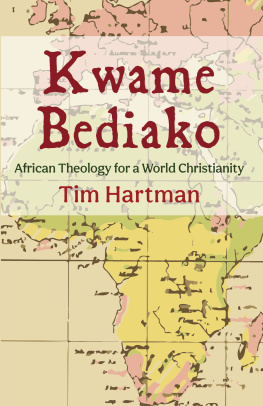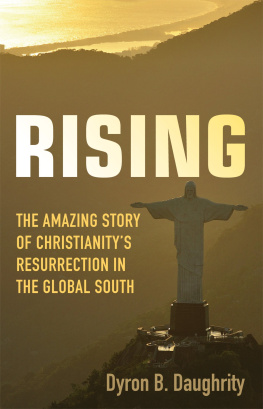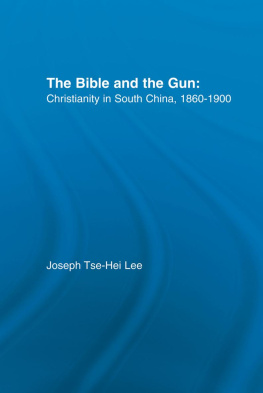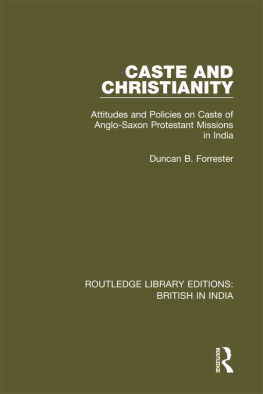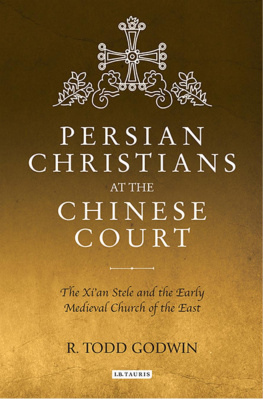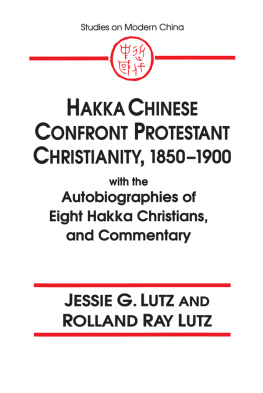FROM CHRIST TO CONFUCIUS

Copyright 2016 by Yale University.
All rights reserved.
This book may not be reproduced, in whole or in part, including illustrations, in any form (beyond that copying permitted by Sections 107 and 108 of the U.S. Copyright Law and except by reviewers for the public press), without written permission from the publishers.
Yale University Press books may be purchased in quantity for educational, business, or promotional use. For information, please e-mail (U.K. office).
Set in Scala and Scala Sans type by IDS Infotech Ltd., Chandigarh, India.
Printed in the United States of America.
Library of Congress Control Number: 2016936804
ISBN 9780300217070 (hardcover: alk. paper)
A catalogue record for this book is available from the British Library.
This paper meets the requirements of ANSI/NISO Z39.481992 (Permanence of Paper).
10 9 8 7 6 5 4 3 2 1
To my beloved parents,
(Maw-Kuen Wu) and (Huichin Tang),
whose unconditional love
propelled every word
CONTENTS
ABBREVIATIONS
BMS | Berlin Missionary Society |
CCP | Chinese Communist Party |
NCC | National Christian Council |
SVD | Society of the Divine Word (Societas Verbi Divini) |
YMCA | Young Mens Christian Association |
INTRODUCTION
Perceptions of Failure
IN 1902 GEORG STENZ , a German Catholic missionary from the Society of the Divine Word (Societas Verbi Divini, SVD), met with the seventy-sixth direct descendent of Confucius and the Holy Duke of Yen, Kong Lingyi. It had taken Stenz years to set up this meeting. He regarded Kongthe heir to Confuciuss legacyas a human capsule of Chinese culture, its living embodiment.
The meeting left Stenz underwhelmed. Kong did not impress me, he later wrote. He knew almost nothing of the situation and learning of Europe. He was also extremely corpulent and lived a thoroughly Chinese existence.
Nor did Stenzs criticisms end there. He sarcastically referred to Confucius as his holiness, ridiculing the deference that ordinary Chinese paid their sage. He called Qufu, Confuciuss hometown, a Chinese Mecca, the bulwark of all pagans.
Stenz was not alone in condemning Chinese religiosity. In the SVDs monthly periodical, Little Messenger of the Sacred Heart
By 1935, however, the SVD had changed its tune. The same periodical that had denounced Confucianism now revered it. If just thirty years before, Qufu was the bulwark of the devil, now it was the greatest Confucian sanctuary in all of China, the hometown of the Sage (Weisen). A sarcastic tone no longer accompanied references to Confucius. When the Chinese Nationalist government decreed it would celebrate Confuciuss birthday as a national holiday, one missionary praised the news, proclaiming, As the star of Confucius rises, so he will point further to Jesus Christ.
The SVD was not an exception: other missionary organizations also dramatically altered their relationship to Confucianism and, more broadly, traditional Chinese culture. In the same year that Stenz met Kong Lingyi, Carl Johannes Voskamp, an influential missionary in the Protestant Berlin Missionary Society (BMS), published an anti-Confucian tract, Confucius and China Today. Like Stenz, Voskamp included an account of a visit to Qufu. Masses of Chinese worshippers, he wrote, with their eyes fixated on the shadow of Confucius, held slabs pronouncing his greatness and prostrated themselves before Confuciuss tombstone. He denigrated Confucian rituals as unthinking, the worshippers as brainwashed. The tract, along with a series of others books and materials, established Voskamp as one of the most outspoken opponents of Confucianism in his day.
After the First World War, Voskamp would never again publish anti-Confucian work. He expressed respect for Confucius as a person, listing him as one of the Great Ancient Sages. Had China followed the actual ideals and teachings of Confucius, Voskamp argued, It would not be mired in its modern problems. Like his Catholic counterparts, Voskamp wrote about Confucianism in a completely different manner by the 1920s.
The radical transformation of the SVD and the BMSfrom outspoken anti-Confucians to Confucian proponentsconstitutes the central inquiry of this book. Why did German Catholic and Protestant missionaries argue in 1900 that Christianitys success depended on Confucianisms demise, and how, by the 1930s, did they come to view the fates of Christianity and Confucianism as inseparable? What are the broader implications of these changes?
The astonishing shifts the BMS and SVD underwent offer us insight into processes of cross-cultural contact and exchange. Throughout the nineteenth century, European and American missionaries went abroad convinced of the transforming power of their message. Many held, at first, an antagonistic attitude toward the local cultures that they confronted. But often it was the missionaries themselves who emerged from the encounter converted. They developed more nuanced views of local religions and cultures, reformed their methods of evangelization, and in some instances abandoned their former beliefs. In this book, I focus on how German missionariesas well as European missionaries more broadlyand Chinese Christians simultaneously shaped, and were shaped by, their encounter with each other.
German missionaries traveled to China as part of a broader global expansion of Christianity during the nineteenth and twentieth centuries. Transported by steamships and railroads, European and American missionaries exported their religion to every corner of the globe. Along with their religion, they brought Western institutionsoften secularwith them. They attempted to establish alternatives to the local schools, medical institutions, and religious organizations that they encountered. Besides appearing as preachers, they assumed various roles as teachers, doctors, theologians, geologists, botanists, and anthropologists. If we accept Yuri Slezkines definition of modernity as everyone becoming urban, mobile, literate, articulate, intellectually intricate, physically fastidious, and occupationally flexible, missionaries embodied and galvanized all of those trends. In this book I probe the story of how European missionaries globalized Christianity in the nineteenth and twentieth centuries and by extension laid the foundations for the modern global religious landscape. In short, I examine how Christian missionaries helped forge the modern world.
Yet Christianitys global spread was not only generative, it was also destructive. In the nineteenth century, many missionaries sought to supplant local religions and customs with Christianity. In turn, local actors equated Christianity with Western imperialism, viewing both as forces seeking to uproot and destroy traditional culture. Anti-Christian hostility and violence erupted throughout the worldin China, in Africa, in South and Southeast Asia. These outbursts of anti-Christian and anti-imperial sentiment swayed not just Christianitys opponents, but converts to Christianity as well: indigenous Christians argued that churches should be independent of European control, as a way to disassociate Christianity from Western imperial ambitions.
Confronted with the prospect of the collapse of their entire enterprise, missionaries began to take criticisms of Christianity seriously. Some believed that by making Christianity devoid of European color, it could expand further and gain more adherents in these foreign lands. As a result, missionaries transferred to indigenous clergy the religious control and authority that they once wielded. Other missionaries sought cultural solutions, hoping to find a way to synthesize Christianity with local tradition. But not all missionaries accepted such a synthesis. Some denounced the syncretism between Christianity and local religions, dismissing it as a watered-down version of Christianity. Fearing impure belief, these missionaries refused to relinquish power over their congregations.
Next page
